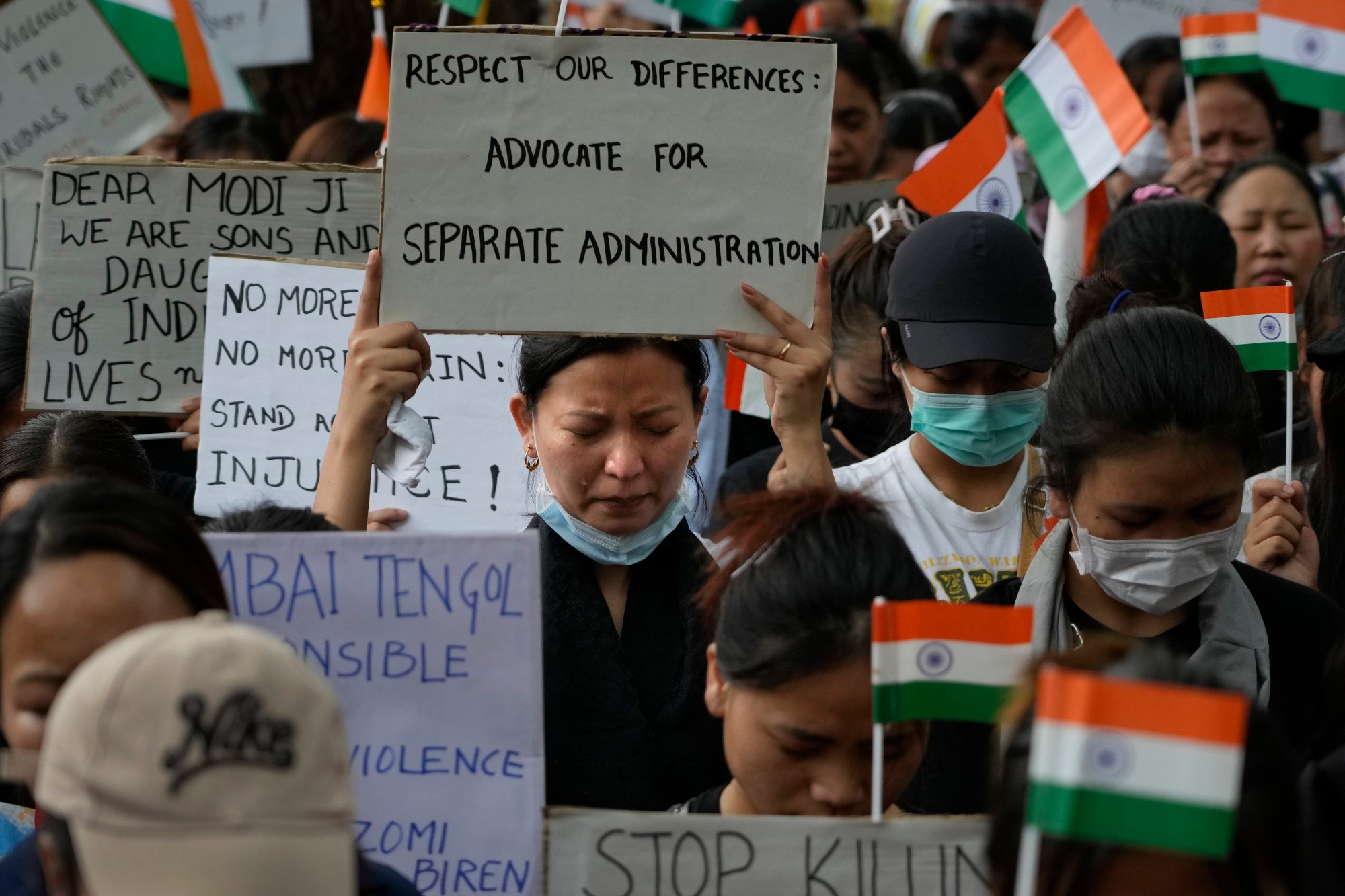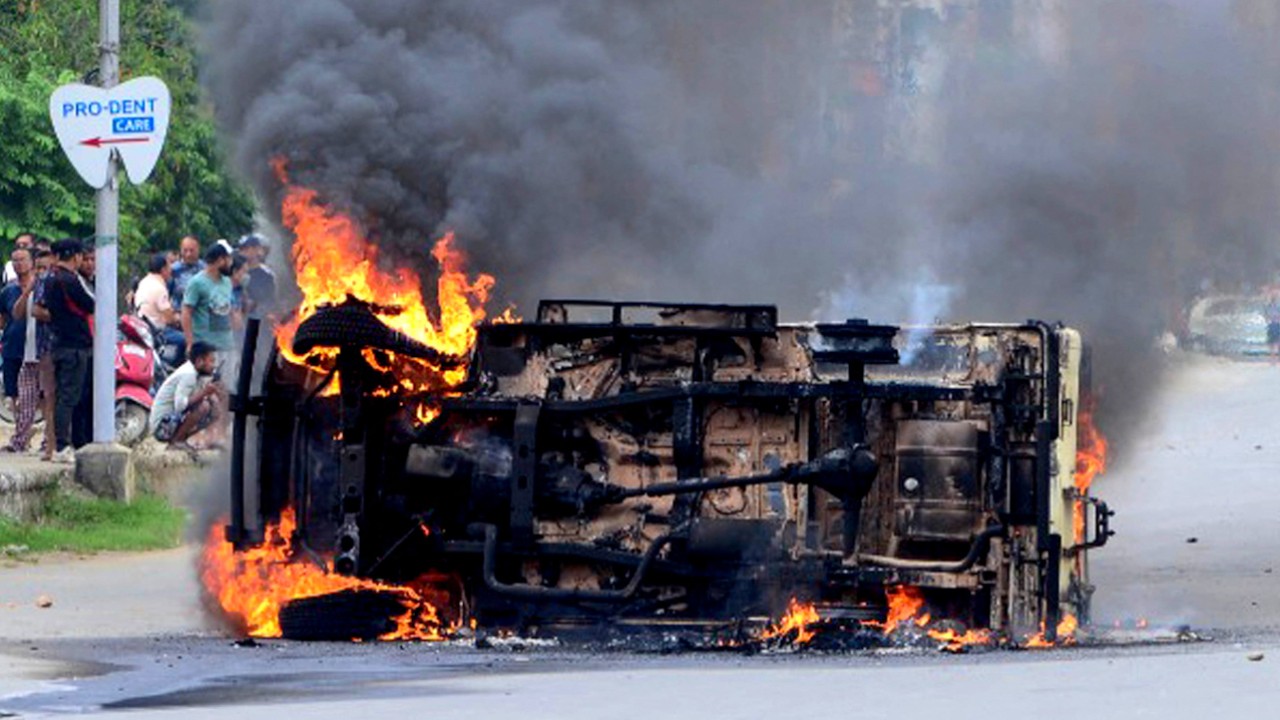
‘How can I ever feel safe?’: India’s Amit Shah faces tall order to restore calm in Manipur after ethnic violence
- Clashes erupted on May 3 over push for majority Meiteis – who are mostly Hindu – to gain access to jobs and university places set aside for Kukis, who are largely Christian
- Home Minister Amit Shah, representing Hindu-nationalist central government, is holding talks in the state, where the chief minister accuses Kukis of terrorism
Some sought safety in refugee camps set up by the military while others left Manipur altogether, to stay with relatives in neighbouring states.
The Manipur government, led by Chief Minister N. Biren Singh, has struggled to restore normalcy, with police killing at least 40 people they claimed were militants.
The authorities will not allow the disintegration of Manipur by “armed terrorists”, Singh said in a statement on Sunday.
Over the weekend, Army Chief General Manoj Pande travelled to the region, about 1,600km (1,000 miles) from Delhi, where thousands of soldiers have been deployed to quell the violence.
Around 35,000 people have been evacuated to safety by the military since the start of the carnage, the army said.
Troops continue patrolling the streets, a curfew is still in place and an internet blackout remains. Flights to Manipur have been cancelled indefinitely and the media have been banned from going there.
We can never live together again. Not after all that’s happened
Shah’s biggest challenge, in his first visit to Manipur since the violence began, is to repair the massive breakdown in trust between the Kukis and the Meiteis. The Kukis say the Meitei-dominated state government has been complicit in the violence, arson and targeting of their places of worship. They allege that some 200 churches have been set on fire over the past month.
The prolonged violence has effectively partitioned Manipur. In a massive displacement of population, Kukis have fled Meitei areas to Kuki districts to feel safe, and vice versa. The physical separation of the two communities is near total. The emotional gulf appears unbridgeable.
“We can never live together again. Not after all that’s happened,” said Kim Varte, a Kuki woman who fled the state capital Imphal to join relatives in the neighbouring state of Mizoram.
“I will never allow my children to enter a Kuki district,” said Kanhai Singh, a Meitei man in Imphal.

The conflict arises from ancient fault lines. The Meitei are the majority, who live mostly in the valley in Imphal, while the Kukis are a tribe living in the lush hills that surround the city. Along with another tribe, the Nagas, the Kukis form about 40 per cent of the state’s 3.5 million people.
For two decades the Meitei have demanded to be given the status of a ‘scheduled tribe’ which would make them eligible for reserved quotas in government jobs and colleges.
The Kukis oppose the demand. They argue that the Meitei are already the majority, more affluent and educated, and more powerful politically since they dominate the government. Of the 60 seats in the state legislature, 40 represent the valley and only 20 the hills – one reason for the Kukis to feel marginalised.

Manipur lags behind most of India in terms of development, and government jobs are the main source of employment.
The anger seen in recent weeks highlights the challenges for Prime Minister Narendra Modi’s administration, especially as he seeks a third term in office in national elections due next year.
“You can see where all the investment has gone,” said Kuki college lecturer Debory Fimsangpui, whose home in Imphal was burnt down by a mob.
Nevertheless, she considers herself lucky. She happened to have taken her son away from the city for a holiday and believes that if they had been at home, they would not be alive today.
“Imphal has all the offices, malls, educational institutes and hospitals. We all come to Imphal for medical treatment and send our children here for education because it has better facilities than the hill districts,” she added.

Though tensions have been simmering for some time, the trigger for the mob violence and arson was an order from Manipur High Court in April, urging the state government push ahead with approving the demand for scheduled tribe status for the Meitei.
Enraged Kukis demonstrated against the order and violence quickly engulfed the state, a popular tourist attraction because of its lakes and forested hills.
Reports suggest that most of the victims have been Kukis but Meitei people were also targeted. It is impossible to verify all the rival claims as there are no flights to Manipur and the media cannot visit.
With no reliable sources of information, rumours and theories are circulating wildly, deepening the mistrust on both sides and hardening the divisions.
On Monday, the first day of his three-day visit to Manipur, Home Minister Shah met politicians and officials. He arrived just as fresh outbreaks of violence had broken out.

The state’s Chief Minister Singh, accused by Kukis of being biased against them, marked Shah’s arrival by saying 40 Kuki “terrorists” had been killed by police in the latest clashes.
“We are not terrorists. We are just trying to defend ourselves against the ethnic cleansing of the Meitei. They have called us illegal migrants and poppy cultivators. Now we are terrorists. We are wondering what they will call us next,” said Kapsuanlian Tungnung, a civil servant in Churachandpur.
In New Delhi, where many families have fled to safety, tearful Kuki women staged a protest on Monday, asking New Delhi to run the state as they had no faith in the Meitei-dominated state government.
One of them was Chong (who goes by only one name), who said her Meitei neighbours watched when a mob burned down her house in Imphal. “They did nothing to stop the mob. They watched as I lost all my possessions, my documents and certificates. If that’s the hatred they feel for me, how can my family and I ever feel safe living alongside them?” she asked.

Some Kukis accuse the Meitei of having become ‘radical Hindus’ out to ‘annihilate’ the Christian Kukis.
“There is a theory that with the Hindu-nationalist Bharatiya Janata Party (BJP) in power in New Delhi, these groups, who wear black T-shirts and shout divisive religious slogans, are out to create communal strife. With the BJP winning power in Manipur in 2017, the belief is that they have become bolder,” said research scholar Suanmualian Tonsing, who returned to India from the US to study the conflict in his home state but has been stranded in New Delhi, waiting for flights to resume.
It is not clear if the breakdown in trust can ever be repaired. “I know generations of Meitei who have worked in government jobs in the hill districts. They cannot believe the Kukis, after all these decades, felt so much hatred for them. Returning to the status quo is out of the question,” said a local journalist who did not wish to be named.
Kuki legislators have demanded a separate administration because, after so much bloodshed, living alongside the Meitei is “as good as death for our people”, they said in a statement on May 13. The demand has grown louder and louder as Kukis continue to feel afraid, a fear that Singh’s government has done little to dispel.
A small example is Tonsing’s travel plan. Once flights resume, he will not travel to his home village in Lamka district the usual way by flying from Delhi to Imphal then driving for 40 minutes.
Bye bye Modi? Ruling BJP voted out in key Indian state
He said he would rather fly to the neighbouring state of Mizoram and drive for 10 hours to reach his destination. “The idea of flying into Imphal airport is just too unnerving and risky,” he added.
Shah has made no comment since arriving in Manipur. How he will respond to demands for a separate Kuki administration is unknown but is unlikely to be favourable. Both sides are waiting to see what solution he proposes in a situation where they see no solution.
Additional reporting by Bloomberg


